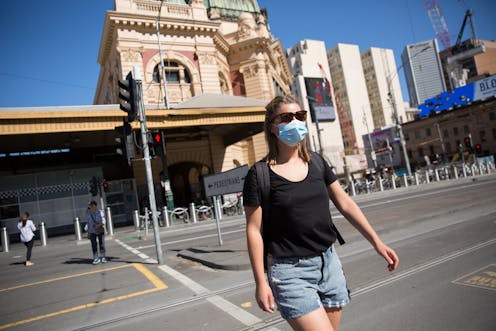Young Australians faced unique challenges even before the pandemic. Neglecting them jeopardises the country's future.
- Written by George Patton, Professor of Adolescent Health Research, The University of Melbourne

Two major reports released in the past week shine a light on Australia’s future.
The fifth Intergenerational Report[1] addressed the sustainability of the Australian government budget through to 2060 based on current economic and demographic trends.
In the context of COVID-19’s disruptions to the national economy, it received much press attention. It made little comment on young Australians, beyond noting they make up a smaller proportion of the population than ever before. Yet young Australians are central actors in the nation’s economic future: they will determine patterns of population growth, workforce participation, productivity and social cohesion.
In contrast, Australia’s Youth[2], the first national report on young Australians in a decade, attracted little attention. The Institute of Health and Welfare (AIHW) report detailed how our 12- to 24-year-olds are faring in their health, education, housing, employment prospects, finances and well-being. In a decade where the lives of young people have profoundly changed with the rise of social media, a gig economy, shifting geopolitics, climate change and most recently the disruptions of COVID-19, the lack of public comment was striking.
Read more: The intergenerational report was sobering, but the reality may be worse[3]
Intergenerational inequality
As Australia enters a phase of falling population growth, how Australia’s youth are faring in becoming healthy, productive and flourishing adults should be a priority — not just for governments, but for all of us.
Even before the pandemic, young Australians faced the prospect of being less well off[4] than their parents. Although spending more time in education than any previous generation, finding a decent job, achieving financial independence, becoming a parent, buying a home of their own and enjoying a good life was eluding many. The pandemic is bringing further disruption and likely to deepen intergenerational inequalities.
Creating opportunities or entrenching disadvantage?
The adolescent and young adult years provide opportunities for social mobility; equally, disadvantage can become entrenched. One in five[5] young Australians are not fully engaged in education or employment, but that figure is much higher in those from poorer neighbourhoods and regional Australia. So too, living in a bigger city or having professional parents brings higher achievement in numeracy and literacy.
These differences will have increased in the pandemic with school closures and online learning. Students from poorer families have had fewer resources for working effectively at home, and many have been less able to call on struggling parents. Surprisingly, we will know very little about the immediate consequences of school closures on learning as NAPLAN assessments for 2020 were cancelled.
Fitness and resilience
The fitness and emotional resilience of young Australians matters for their future health and well-being, and their contribution to future families, communities and the broader economy. Their mental health profiles remain poor.
Trends in psychological distress and presentations to hospital with self-harm, particularly for adolescent girls, have worsened[6] in the past decade. As loneliness and social isolation have increased in the pandemic, so too levels of psychological distress in 18- to 24-year-olds rose substantially through to April 2020 without, as yet, a return to pre-pandemic levels.
Physical fitness peaks in youth and predicts people’s health through their lives. Just over one in ten[7] 15- to 17-year-olds is meeting international guidelines for physical activity. Obesity in young Australians has continued to rise with declining physical activity and increased consumption of highly processed foods. The longer terms implications for cardiovascular disease, cancer, infertility, type 2 diabetes and mental disorders in adulthood will be great.
Read more: 5 charts on how COVID-19 is hitting Australia's young adults hard[8]
Why the Australia’s Youth report matters
The AIHW report holds governments to account for their investments in our young. Mental health is a case in point. In this area, 15 years of investment in youth mental health appear to have done little. In reality, it’s hard to track the mental health of young Australians as our data have been so poor. In that context, it is hard to understand why the new $90 million Intergenerational Health and Mental Health Study[9] has no plans to include Australians younger than 16.
This generation faces wicked problems without simple solutions. We need to move beyond the short-term, issue du jour approach that has dominated government responses in recent decades. Mental health, physical fitness, educational engagement and underemployment are interconnected. They are embedded in the communities, schools and families in which young Australians are growing up. Effective responses lie beyond any single sector, government department or three-year election cycle.
With the effects of COVID-19 yet to play out, and the challenge of climate change, we cannot afford to wait ten years for the next report. More regular reports would provide a basis for moving beyond simplistic and short-term policy responses.
At the very least, the Australia’s Youth report every five years, in tandem with the Intergenerational Report, would provide a mechanism for reviewing government investments in our most precious resource: our young people. It would create an opportunity for a sustained engagement with young Australians around their unique challenges, that they understand better than politicians and bureaucrats. The nation’s future depends on it.
References
- ^ Intergenerational Report (treasury.gov.au)
- ^ Australia’s Youth (www.aihw.gov.au)
- ^ The intergenerational report was sobering, but the reality may be worse (theconversation.com)
- ^ less well off (grattan.edu.au)
- ^ One in five (www.aihw.gov.au)
- ^ have worsened (www.aihw.gov.au)
- ^ Just over one in ten (www.aihw.gov.au)
- ^ 5 charts on how COVID-19 is hitting Australia's young adults hard (theconversation.com)
- ^ Intergenerational Health and Mental Health Study (www.health.gov.au)

















